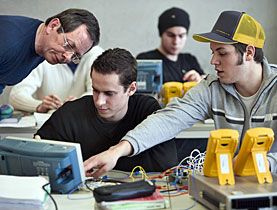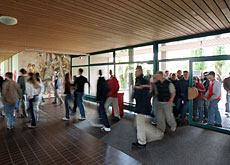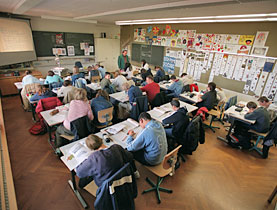Swiss teenagers face steep learning curve

A high proportion of school leavers face delays in finding the ideal apprenticeship - a result of their social background and economic problems, a study has found.
Migrants and girls are particularly disadvantaged, according to the first ever Switzerland-wide research into the transition from school to work.
The Transition from Education and Employment (TREE) study is an interdisciplinary project which has been running since 2000. Basel University has just announced that it is to take over the next phase.
The lack of apprenticeship places and the difficulties faced by foreigners in particular have been the subject of much recent media and political debate. Around two thirds of school leavers opt for training over higher education.
In 2007 there was a shortfall of 5,000 apprenticeships, according to the government. Youth unemployment in March stood at 2.9 per cent, above the 2.6 per cent population average.
“Switzerland is such a rich country and this transition from school to work used to be really smooth… and then the labour market broke down in the 1990s and the apprenticeship market was the first one to feel the effects. That’s when people realised it would be good to look at these transition patterns,” Sandra Hupka-Brunner, an expert in pedagogy at the university, told swissinfo
TREE has followed 6,000 young people in Switzerland who were included in the 2000 Pisa – programme for international student assessment – study which tested reading and mathematics skills in 57 countries.
In 2000 they were all around 15 years old and had finished compulsory schooling.
They were due to go on to Secondary II level, which lasts up to four years and involves either vocational training for direct entry into the labour market, or prepares students for tertiary education.
Surprise results
Researchers were surprised to find just how many school leavers were suffering delays during this important transition period, said Hupka-Brunner.
“In the first year around a quarter had to find intermediate solutions, such as doing work experience or a language course, when they did not find their ideal training place, she explained.
“Only half of the school leaver cohort from 2000 is to be found entering and passing through the whole of its upper secondary education & training without delays and discontinuities,” she added.
Skills were found to be less important than type of school or social background.
“Pisa has shown that social origin is much more important in Switzerland than in other countries. Pupils with a better social backgorund have more opportunities for developing good skills,” explained Hupka-Brunner.
Foreigners
Migrants are particularly affected. “If you are a bright pupil and you have good grades but your name sounds foreign or you come from Sri Lanka you have more problems finding an apprenticeship,” she said.
Girls, too, often faced delays, said Hupka-Brunner, as many are focused on service posts whereas the apprenticeship market is based around the more traditional “male” jobs like technicians. Not all of these companies are willing to employ young girls, she remarked.
Those struggling to find apprenticeships should try work experience. It is better to opt for an intermediary solution than to do nothing, advises Hupka-Brunner.
Mentoring schemes and the promotion of apprenticeships by the local administration can also help to combat delays.
However Hupka-Brunner believes that in the mid to long term changes are needed in vocational education and training.
“We’ve got a good system but times are changing and we need to think of how we can cope with these current problems and of having a more integrative school system,” she said.
swissinfo, Isobel Leybold-Johnson
Basel University’s Sociology Institute is in charge of the next phase of TREE. It will be analysing the data collected, from sociological, psychological and pedagogical angles.
The study is unique in that it follows up Pisa – only Canada and Australia are carrying out similar initiatives. It is nation wide and follows students from all school tracks.
Results are being made available to the wider scientific community as well as to teachers and to political decision makers.
The next follow up study is planned for 2010.
Students in apprenticeships are normally hired and employed/trained by a company, while spending 1-2 days a week in vocational college. The mix of school and practical training is claimed to be one of the most important advantages of this dual system.
Students have a choice of about 300 recognised apprenticeship categories. Apprentices who pass the final exam at the end of their basic training are awarded a federal diploma which is recognised throughout the country.
Generally, the programmes followed (and the grades obtained) on lower secondary level serve as school selection criteria.
School systems vary according to cantons, which are in charge of education matters.

In compliance with the JTI standards
More: SWI swissinfo.ch certified by the Journalism Trust Initiative












You can find an overview of ongoing debates with our journalists here . Please join us!
If you want to start a conversation about a topic raised in this article or want to report factual errors, email us at english@swissinfo.ch.